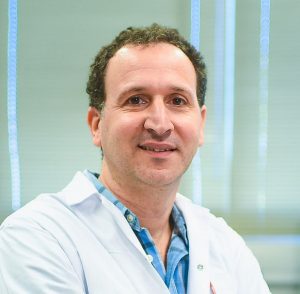Bacteria to Cure Fungal Infections
Technion Researchers Use Bacteria to Cure Fungal Infections
HAIFA, ISRAEL (August 19, 2018) – Researchers in the Technion-Israel Institute of Technology’s Faculty of Biotechnology and Food Engineering have cured fungal infections using a soil-dwelling bacteria. The findings of the research led by Assistant Professor Boaz Mizrahi and conducted by his student Maayan Lupton and Dr. Ayelet Orbach were published recently in Advanced Functional Materials.
Fungal infections are common among various animals, including humans. One of the primary sources of such infections is Candida – a yeast regularly found in our bodies. Candida exploits abnormal functioning in the organism to spread and harm the host. Most people will experience a fungal infection at least once in their lifetime, in some part of their body – on the skin, in the digestive system or genitals.
The frequency of fungal infections is constantly on the rise due to the aging population and possibly global warming. Additional reasons include the use of drugs, which suppress the immune system, and the increased use of broad-spectrum antibiotics, which indirectly enhance the proliferation of Candida by disrupting the bacteria balance in the body.
Oral antifungal drugs administered today are associated with low efficacy, a spectrum of side effects, such as headaches and rash, and in certain cases, with life-threatening liver and kidney toxicities. In addition, Candida strains resistant to existing drugs have already been discovered.
The researchers assessed the possibility of treating Candida via the Bacillus subtilis bacterium, which naturally produces and secretes substances that inhibit Candida growth. This mechanism evolved in the bacteria as part of its competition with Candida over common growth substrates.
“Our first challenge,” said Assistant Professor Mizrahi, “was to develop a transport system that would enable application of the live bacteria on the infected lesion without impairing their ability to proliferate and secrete their therapeutic substances in the target site.”
To do so, the researchers developed a unique gel that is in liquid form in the refrigerator and at room temperature (enabling easy application on the skin), but which hardens within seconds after being applied to the skin. Beside the thermo-responsive polymers, the gel contains food substances, which ensure maintained bacterial viability on the skin, where they can “treat” the infection.
The researchers applied the gel on the skin of mice suffering from a fungal infection, after marking it (the gel) with a fluorescent substance that would allow for monitoring. The formulation penetrated deep into the skin but not into the underlying blood vessels, implying that the effect of the formula is limited to the diseased area. Later, the clinical efficacy of the bacterial formulation was demonstrated on mice suffering from Candida infection. In the control groups – treated with bacteria-free gel or not treated at all – the infection continued to develop, but the group treated with the Technion-developed bacterial gel showed rapid skin healing. Moreover, comparison of the novel treatment to the commonly used ketoconazole demonstrated the superiority of the Technion gel both from the clinically and the safety point of views.
The researchers noted that aside from development of the unique gel, a new therapeutic treatment model was demonstrated here: a minuscule factory, which after its penetration into the target, begins to produce the active substance. This is in contrast to the standard pharmaceutical model, in which the drug passes through the entire body and portions of it may be broken down in the process. The researchers hope that their novel model will be used in the future to treat a range of diseases, including psoriasis, acne, various inflammations and even cancer.
In addition to his position in the Technion Faculty of Biotechnology and Food Engineering, Assistant Professor Boaz Mizrahi is a member of the Technion’s Russell Berrie Nanotechnology Institute and Lorry I. Lokey Interdisciplinary Center for Life Sciences and Engineering.





